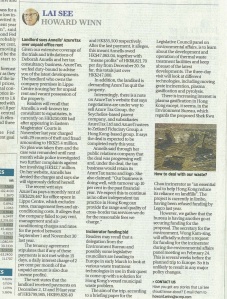| Government needs to rethink its waste management policy
We see that the forces in favour of building a large incinerator near Shek Kwu Chau are coming together for another push at getting the project approved by the Legislative Council. A South China Morning Post story recently reported that a group of academics and professionals were calling on the government to scale back landfill and get on with building the incinerator.
“We need to act now, or this will end with rubbish piling up on the streets,” said Professor Poon Chi-sun, of Polytechnic University’s civil and environmental engineering department and spokesman for the new Alliance for Promoting Sustainable Waste Management for Hong Kong. Poon says the government is right to adopt moving-grate technology – in which waste goes through a combustion chamber – in its incinerator plan, adding that the technology is used in 2,000 plants around the world.
What he doesn’t say, however, is that the number of operating incinerators and the installation of new ones is declining. In the United States, the number of moving-grate incinerators dropped from 186 in 1990 to 87 in 2010. In Japan, it fell 25 per cent between 1998 and 2005. In Europe, there is an overcapacity of incinerators because of successful recycling efforts. Not so long ago, New York City issued a tender for a waste management facility specifying that it did not want offers using traditional moving-grate technology.
Professor Irene Lo Man-chi, of the University of Science and Technology’s department of civil and environmental engineering, said the technology had been proved to be a reliable option that was safe in terms of emissions. This is a moot point, and there are peer-reviewed reports showing abnormally high death rates and incidence of cancer among people living near incinerators. We accept that modern incinerators produce less emissions but that is not to say they are safe.
One technology that is known to produce far less emissions than incineration is plasma gasification. However this is dismissed as the wrong choice by Lo, who says it wouldn’t be able to cope with Hong Kong’s volume of waste. And by way of support, she says that problems with plasma technology had led to the closure of a 10-year-old plant in Japan. She omits to say that the plant was closed because it ran out of feedstock. She also appears oblivious to the number of plasma gasification projects that are springing up all over the world.
Ever since the incinerator project was introduced, the Environment Bureau has refused to budge from its insistence that it must be built, even with the change of leadership at the bureau. It also continues with the politically expedient reasons for locating the incinerator at Shek Kwu Chau rather than at Tsang Tsui near Tuen Mun. But it is clear to many people that if any progress is to be made on this, then some aspects of the plan have to be rethought. About 42 per cent of Hong Kong’s waste that goes to landfills is food waste and is between 70 and 90 per cent water.
Clear the Air chairman James Middleton has spoken to three engineers who say it is perfectly feasible for food waste to be shredded at source using garburators and disposed of down the drain and handled by the Stonecutters water treatment plant, which is currently operating at 50 per cent capacity. This idea has been incorporated into the thinking of the New Territories Concern Group, which, after visiting various waste treatment plants, including plasma gasification projects in Europe, produced a report supporting the use of plasma technology. The group is politically significant and includes Junius Ho Kwan-yiu, who, in addition to being a former president of the Hong Kong Law Society, also has the distinction of having deposed Heung Yee Kuk chairman Lau Wong-fat as chairman of the Tuen Mun Rural Committee.
In addition to its support for disposing of food waste at source, the report suggests gasification as a more mature and appropriate technology to meet Hong Kong’s present and future waste management needs. It recommends the establishment of one or more pilot plants to determine the suitability of gasification technology for Hong Kong. This approach would give Hong Kong considerable breathing space for it to take another look at the options available rather than its current approach, which is making little progress. |



You must be logged in to post a comment.